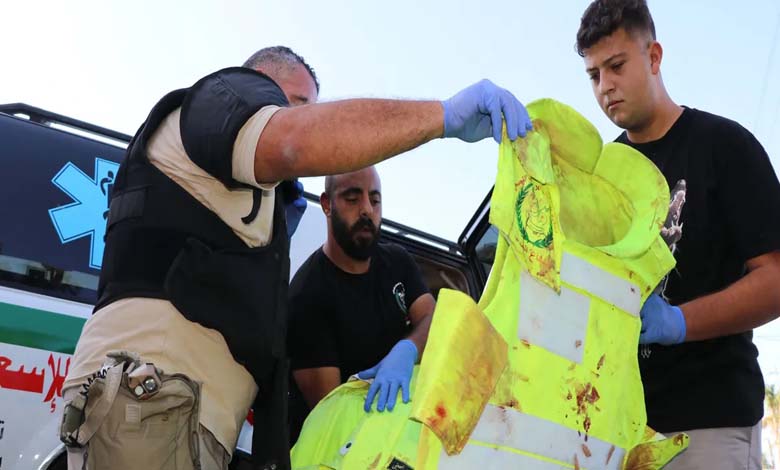Lebanese doctors fear the collapse of their exhausted hospitals if the war escalates

From his office overlooking the border with Israel, Dr. Munis Klaksh can hear the sounds of artillery shells and airstrikes falling on nearby Lebanese towns, according to a report prepared by Reuters.
The increasing intensity of these attacks has instilled fear in the hearts of the staff in his small hospital, causing anxiety to overwhelm them.
Klaksh said, “So far, we have treated 51 people who were injured as a result of the shelling last month. About 17 of them have died or arrived dead. And beyond that, we are crumbling.”
Klaksh, the director of Marjayoun Hospital in southern Lebanon, serves around 300,000 people in the region. The hospital has 14 emergency beds and is struggling to operate due to a shortage of staff, and more importantly, a shortage of fuel. The hospital operates on generators for 20 hours a day, and it has to pay up to $20,000 monthly for fuel. Klaksh said, “None of this money comes from the government anymore. We rely on the funds available in the hospital from week to week.”
If the fuel runs out, the hospital will close. Klaksh explained, “We cannot turn off sections of the hospital.”
Dozens of other public hospitals are also at risk, made vulnerable by the economic collapse that Lebanon has been experiencing since 2019, struggling to adapt during peacetime.
Now, the escalating conflict on the southern border with Israel is pushing the healthcare sector into a new crisis. Doctors are concerned that the recent war in the Middle East might extend beyond the point of collapse.
The fighting erupted on the Lebanese-Israeli border after Israel and the Hamas movement entered into war since October 7th.
-
‘Reporters Without Borders’ accuses Israel of turning Gaza into a graveyard for journalists… Details
Hezbollah, the Iranian-backed Lebanese party and ally of Hamas, launched missiles at Israeli forces, while Israel targeted areas along the borders in escalating attacks that raise concerns about the widening scope of the conflict.
These are the bloodiest acts of violence between Israel and Hezbollah since their destructive war in 2006, resulting in the deaths of over 70 Hezbollah members, ten Lebanese civilians, and ten Israelis, mostly soldiers. Shells are falling on Lebanese cities and villages on a daily basis.
The hospital on the highest hill in Marjayoun has endured its share of the worst humanitarian crises. Doctors evacuated patients under aerial bombardment during the 2006 Israeli invasion, which killed hundreds. In the 1980s, another Israeli invasion led to isolating southern Lebanon from the rest of the country.
But this time, Klaksh and doctors in other hospitals say they are not equipped to deal with the current levels of violence, let alone a larger war.
In recent years, Lebanon has moved from one crisis to another. The financial collapse since 2019 and the horrific explosion in the port of Beirut in 2020 have pushed Lebanon to the brink of the abyss.
Government funds have run out, thousands of doctors and nurses have left the country, and hospital budgets have been reduced.
“We expect strikes in hospitals,” said Klaksh.
Marjayoun Hospital is no exception. Klaksh says many of his staff have left for larger cities or foreign countries.
“We had four or five surgeons in 2006, specialists in orthopedics and obstetrics. Now we have one specialist in each field, and they work very long hours without any replacements,” he added.
The Lebanese Ministry of Health says its budget is no longer able to meet the needs. It hastily sent trauma treatment supplies to government hospitals this week, anticipating the worst. The International Committee of the Red Cross said it supplied hospitals, including Marjayoun, with fuel.
A surgeon in a private hospital in nearby Nabatieh said emergency aid would not arrive to such an extent unless the fighting intensifies.
Dr. Moussa Abbas added, “Any hospital in Lebanon can accommodate 40 to 50 cases per week. Any Lebanese hospital does not have complete readiness.”
Klaksh said that Lebanese displacement after the financial crisis means that there are only a few people left for treatment. But the influx of patients could clog the narrow passage leading to the joint emergency room and reception area.
Klaksh prepared the hospital and renovated it in the months before the financial collapse when government funds were available. He bought kidney washing machines and moved the washing room to an external building to provide more space for patient treatment. But he is worried that all of this could disappear in an airstrike, and he watches with horror the neglect of protecting medical staff in Gaza.
Israeli airstrikes on Gaza led to the destruction of 25 hospitals in the besieged Palestinian sector. Lebanese authorities said an Israeli shell hit a small hospital near the border last week.
Klaksh said, “The fear of hospital shelling is definitely present; this is our destiny. Our duty is to be here and to continue as much as our capabilities and resources allow, and hopefully, things will not evolve for the worse.”












